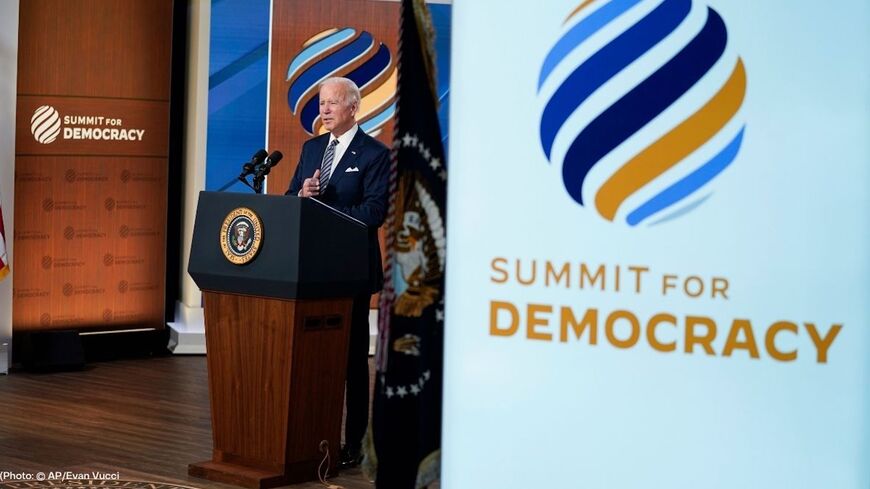WASHINGTON — Turkey is not among the more than 100 countries invited to participate in the Biden administration’s upcoming Summit for Democracy aimed at countering rising authoritarianism abroad and bolstering human rights.
The three-day summit next week, which is co-hosted by the governments of Costa Rica, the Netherlands, South Korea and Zambia, is the second of Joe Biden’s presidency. Like the first-of-its-kind gathering in December 2021, this year’s summit is likely to draw criticism over why some countries with problematic rights records like India and the Philippines made the cut, while NATO allies Turkey and Hungary were excluded.
A State Department spokesperson confirmed all governments that participated in the first summit received invitations for the second, with some additions, and stressed that the administration was “not seeking to define which countries are and aren’t democracies.”
The White House has yet to formally announce the participants, but Rob Berschinksi, the National Security Council’s senior director for human rights and democracy, confirmed to reporters that Turkey was omitted from the invite list.
He described Turkey as “an important NATO ally of the United States and an incredibly important partner,” but that the “US government has been quite clear in terms of our assessment of the status of democracy and human rights within the country.”
Turkish President Recep Tayyip Erdogan has overseen a wide-ranging crackdown on critics since a 2016 coup attempt that Ankara blamed on followers of US-based cleric Fethullah Gulen.
The State Department’s annual human rights report details the “continued detention of tens of thousands of persons including opposition politicians and former members of parliament, lawyers, journalists, human rights activists and an employee of the US Mission for purported ties to ‘terrorist’ groups or peaceful legitimate speech.”
The summit comes as US-Turkey ties are strained over a number of issues, including Erdogan’s slide toward authoritarianism, Ankara’s drift toward Moscow and its threatened military action against US-backed Kurdish fighters in Syria.
Adding to the tensions is Ankara’s foot-dragging on Sweden's and Finland’s bids to join NATO, which lawmakers have cited in holding up a potential $20 billion sale of F-16 fighter jets to Turkey. Last week, Erdogan announced his country would begin the ratification process for Finland’s membership only.
Soner Cagaptay, an expert on Turkey at the Washington Institute, described Turkey as neither a democracy nor a dictatorship, citing in part Erdogan’s consolidation of independent institutions and the media.
“It is a democracy that has fallen under an autocrat, and I think that's reason enough for Turkey, together with Hungary, not to be invited to the summit,” Captagay said.
Turkey, however, could get an invite next year. The country is expected to hold nationwide elections in mid-May that will determine whether Erdogan can extend his two-decadeslong grip on power. Turkey's main opposition alliance has promised to roll back many of Erdogan’s authoritarian policies if he is unseated.
“Turkey has a really powerful democratic resilience and memory that is trying to push back against Erdogan, so the elections are a toss-up,” Cagaptay said.
Turkey was also left off the invite list for the December 2021 summit, as were key US partners in the region including Egypt, Saudi Arabia and the United Arab Emirates. The only Middle East countries to secure an invite were Israel and Iraq.
Israel’s invitation this year comes as Prime Minister Benjamin Netanyahu’s government — Israel’s most right-wing and religious in history — advances a judicial overhaul plan that critics charge would undermine the country’s democracy.
In a recent phone call with Netanyahu, Biden "underscored his belief that democratic values have always been, and must remain, a hallmark of the US-Israel relationship," according to the White House. Netanyahu, who is on trial for corruption charges he denies, has refused to withdraw his plan despite monthslong protests in Israel and mounting public criticism from the Biden administration.
Freedoms are marginally improving across the Middle East, according to Freedom House, a nonpartisan Washington think tank that studies democracy around the world. Its annual survey found Israel, Lebanon, Saudi Arabia and the United Arab Emirates saw improvements in political rights or civil liberties in 2022. Only Iran and the West Bank experienced declines.







